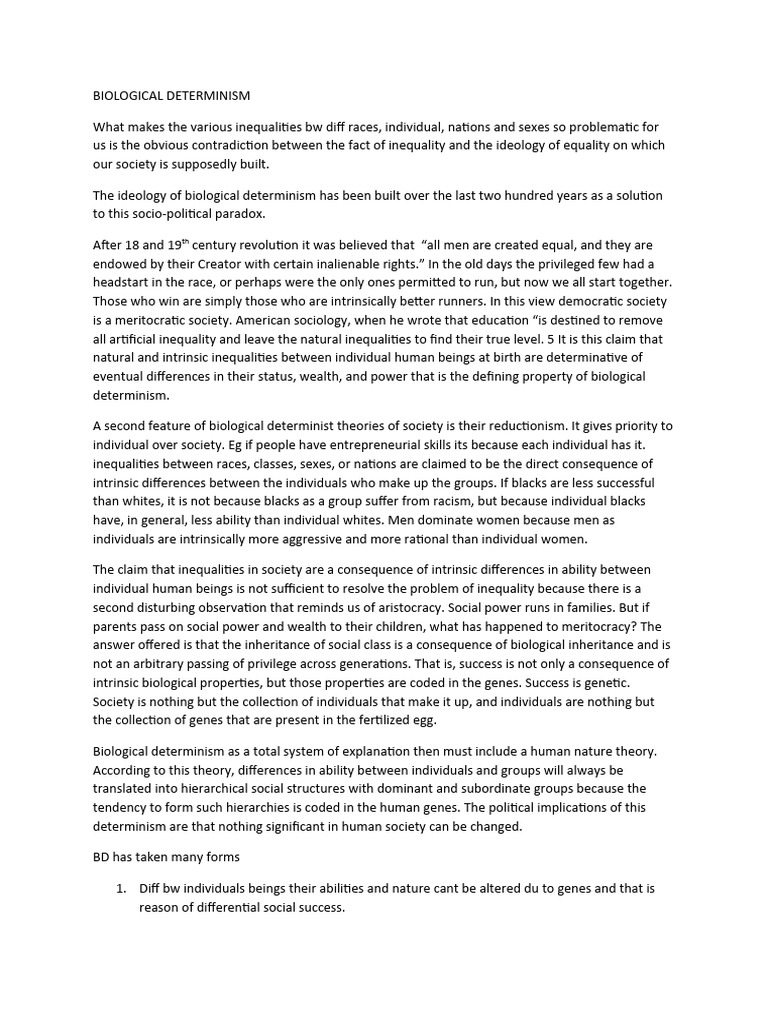Biological determinism is an intricate tapestry woven from the threads of genetics, evolution, and the complexities of human behavior. At its core, it is the idea that biological factors—particularly our genetic makeup—determine not only our physiological characteristics but also our intellectual capacities, behaviors, and even social hierarchies. The notion evokes a methodological similarity to the age-old debate of nature versus nurture. In this exploration, we shall unfurl the multifaceted implications of biological determinism, peeling back layers to reveal how this concept permeates various domains, from science to ethics, and how it shapes our understanding of humanity.
To commence, let us consider the concept of innate potential, which biological determinism posits exists within every individual. Just like a seed contains the blueprint for a magnificent oak tree, so do human beings harbor innate traits predisposed by their genetic coding. This metaphor of the seed highlights the paradox of potential: at birth, one appears to be a blank canvas; however, the underlying genetic structure arguably dictates the possibilities of one’s eventual development. Yet, what happens when the environment—like weather or soil conditions for the seed—alters the trajectory of growth? Herein lies the contention. Is the tree that grows stunted due to poor nourishment a result of its genetic limitations, or does the environment serve as an equally powerful determinant?
The dialogue between genetics and environment aligns with the philosophical inquiries posed by figures like John Locke, who championed the idea of tabula rasa, suggesting that human beings are born without built-in mental content. Contrasting this is the historical perspective of biological determinism, which has been leveraged to justify social disparities, racism, and sexism. Such misinterpretations of genetic predispositions can manifest as a dire misallocation of resources within societies, leading to systemic inequalities. This has perpetuated narratives that reinforce social hierarchies, often undermining the imperative of social justice.
Consider the community garden as a tangible analogy for society at large. Each plot may represent a distinct individual, carefully planted in the same fertile ground. However, the outcome varies significantly based on both the unique properties of the plant—a metaphor for genetic make-up—and the cultivation practices—representing environmental influence. In cultivating these plots, one might employ different methods: some may receive ample sunlight, others shaded by overgrown hedges, and some watered regularly while others are neglected. This disparity in treatment ultimately leads to a divergent harvest. Recognizing this interplay between genetics and environment is crucial in understanding the hierarchy of societal outcomes.
As we venture further into the implications of biological determinism, we encounter the ethical quandaries it presents. The advancement of genetic research, including the Human Genome Project and CRISPR technology, challenges our perception of inherited traits and lays bare the moral complexities of our choices. What are the ramifications of employing genetic information to influence life decisions? For instance, should parents have the right to select for particular traits in their offspring? This question echoes the eugenics movements of the 20th century, with ominous reminders of the potential for discrimination and a dystopian future rooted in genetic elitism. The concept of a “designer baby” raises significant moral implications, forcing society to confront the boundaries of parental agency and state responsibility.
Moreover, biological determinism extends into realms of social policy and economics. In the sphere of education, assumptions surrounding intelligence linked to genetics can propagate stereotypes and establish systemic barriers. For instance, societal narratives derived from perceived genetic predispositions may unjustly influence curriculum development and funding allocation, reinforcing an inequitable academic environment that stifles potential hidden beneath layers of bias.
Intriguingly, discussions surrounding biological determinism can also encompass contemporary issues such as climate change. Just as certain genetic traits can predispose individuals toward particular behaviors, social structures and norms can heavily influence collective responses to environmental crises. The polarization observed in climate dialogues exemplifies how biological determinism may surface in arguments pertaining to responsibility. Are those who deny climate change genetically predisposed toward such beliefs, or is their position shaped primarily by their cultural environment? This juxtaposition accentuates the nonsensical polarities that often beset critical issues, necessitating a nuanced understanding of human behaviors. The metaphor of a species adapting to environment highlights that genetic factors do not exist in isolation; they interact intricately with the ecosystem of beliefs, practices, and historical contexts.
In summation, biological determinism encapsulates a complex interplay between genetics and environment that challenges our understanding of human behavior, potential, and societal roles. It demands rigorous scrutiny, echoing through the chambers of ethics, social justice, and scientific inquiry. By examining the intricacies of this concept, we may commence a discourse that transcends simplistic labels and engages with the profound nuances of human experience. As we navigate this labyrinthine discussion, it is essential to champion inclusive narratives and equitable possibilities, ensuring that every individual, irrespective of their genetic makeup, has the opportunity to flourish within their given environment and transform society for the better.
